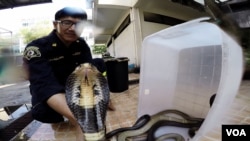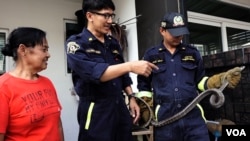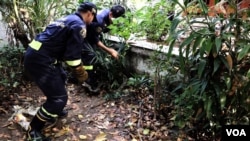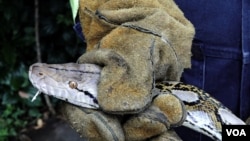Bangkok has a python problem.
The Thai capital is reminded of that whenever a particularly sensational snake sighting makes headlines, such as when a python was videotaped regurgitating a grown dog. Or the time a couple of years ago a woman stepping out of her shower was bitten by a python, emerging from the toilet, which then attempted to drag her down the drain.
In all, thousands of times every year the 199 hotline of the Bangkok Fire and Rescue Department rings with an urgent request to dispatch a snake wrangler.
Over the past dozen years on the job, fireman Pinyo Pookpinyo has been responsible for clearing the city of more than 10,000 snakes.
On a recent call, Pinyo deftly latched onto a three meter-long python, much to the relief of a Bangkok homeowner into whose garden the snake had slithered.
“We'd like to warn people who spot these snakes: Please don’t try to catch them yourself,” said Pinyo. “They’re prone to crawl into residences where animals are being raised, especially chickens, birds, or that have rodents. So you'd better keep your home tidy and your pets fenced because these snakes will eat them.”
During cooler weather the snakes are scarce, but calls to 199 escalate in the rainy season.
Eighty percent of the time the snake calls are for pythons in search of a meal. Nearly all are the reticulated variety, which is the world’s longest reptile, with the occasional more docile Burmese python.
Since Pinyo has been on the job, the number of pythons in Bangkok, which sits in an alluvial plain with pockets of tropical foliage, has “absolutely decreased” — in no small part, he claims, due to him single-handedly apprehending so many of them.
Pinyo’s biggest scare was early in his career when he was bitten releasing a highly venomous pit viper, known for their quick striking capabilities. Fortunately for the fireman he was rushed on the back of a motorcycle to a hospital just a few kilometers away for an injection of anti-venom.
Years of handling snakes has made him adept at dealing with the serpents. But even he is still vulnerable, recently suffering an injury when a python managed to sink its teeth into his left hand.
The wranglers say there is usually no need for citizens to be alarmed when they spot a snake. The majority of the city’s ophidians are not dangerous but some will bite if they feel threatened by panicky humans.
“Nearly all of the bites result from humans being careless,” he said.
Vipers, cobras and kraits
In a typical year between 7,000 and 9,000 Thais do get bitten by snakes and there are typically a few dozen deaths, mainly in rural areas where there are more venomous species and victims do not seek medical treatment quickly enough.
Besides the vipers, cobras and kraits are Thailand's most infamous snakes with deadly fangs.
The monocled cobra is found throughout Thailand and Southeast Asia. It tends to strike when the temperature is above 35 Celsius and its bite is rapidly fatal.
“Their venom is just for hunting, not self-defense,” said Pinyo. “You might just get a dry bite without any venom being spit but all victims should seek immediate medical attention as even a small amount of venom can kill a human in as little as an hour's time.”
Slightly less dangerous is the fast-moving king cobra, growing to nearly six meters in length. They have even been known to kill elephants but they prefer other snakes at meal time.
On another emergency call the same day Pinyo snags the python results in the discovery of a baby copperhead rat snake, which is harmless.
“Try to keep your house clean and prune your trees to keep them free of these critters,” the fireman advised the homeowner.
Advising homeowners
The snake wranglers are patient to educate Thais who wrongly believe such things as sprinkling slaked lime will keep houses free of snakes.
Another widespread myth: strings made from banana trees can calm snakes.
The best way to avoid repeat encounters between humans and serpents is to keep them at a distance.
Some captured species, such as the rat snakes, are set free locally, where they help to combat the capital's rodent infestations. But most are released in rural areas.
This past Sunday, Pinyo released more than 50 pythons, a trio of cobras, a pair of pit vipers and a single ornamental gliding snake (mildly venomous) in the wilds of Phetchaburi province, more than 100 kilometers southwest of the capital and near the border with Myanmar.
As the last of the freed reptiles slithered towards a large, pond Pinyo expresses satisfaction in doing his part to alleviate Bangkok’s serpent trouble.
“In Thailand, a Buddhist country, causing distress, even to animals, is a kind of bad karma,” the wrangler explained. “So I'm convinced people would agree that releasing snakes like this is better than killing them. It's really the best way.”
Also see: Steve's Photo Gallery "Bangkok Snake Wranglers in Action"











